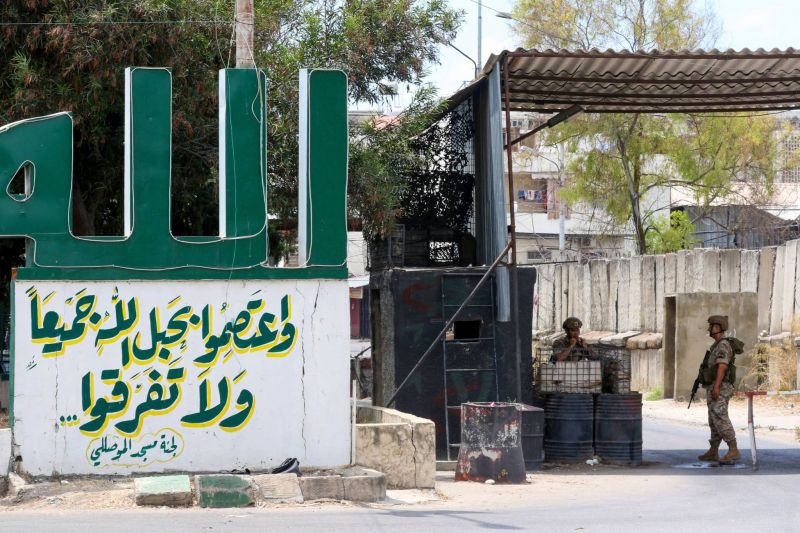
Lebanese soldiers stand guard at one of the entrances to the Ain al-Hilweh Palestinian refugee camp, Lebanon's largest, in the southern coastal city of Saida, on July 31, 2023, during ongoing clashes between the Fatah movement and Islamists inside the camp. (Credit: Mahmoud Zayyat/AFP)
Want to get the Morning Brief by email? Click here to sign up.
The Ain al-Hilweh camp outside Saida is in a state of relative calm after rival Fatah and Islamist factions agreed to a ceasefire yesterday following three days of clashes. The fighting killed at least 11 people, injured dozens and forced hundreds of families to evacuate. On Sunday, Palestinian security official Abu Ahmed al-Armoushi was killed along with several of his bodyguards. Residents who fled the fighting and sheltered in nearby schools and a mosque told L’Orient Today that their homes had been hit by gunfire and rockets, adding that at least one injured person had to be carried out on a vegetable cart as heavy shooting prevented ambulances from entering the camp. Security forces closed the camp’s entrances and redirected traffic due to stray bullets. The Saida Governmental Hospital evacuated its patients on Monday, while the city’s residents warned each other to stay indoors. According to a statement, the ceasefire agreement was reached “with the sponsorship of Hezbollah and the Amal Movement.”
Wassim Mansouri, who is acting Banque du Liban (BDL) governor as of today, expressed his intention to curb the central bank’s exchange rate intervention, announcing the start of discussions with the government today. “BDL must completely stop financing the government outside of a legal framework,” Mansouri said. The same day, Caretaker Prime Minister Najib Mikati distributed a draft law to cabinet that would “enable the government to borrow foreign currency from the [BDL] to finance civil servants' salaries.” The acting governor called for the “liberalization and unification" of the lira-to-dollar exchange rate and announced that the BDL exchange platform Sayrafa would be phased out — with dollar payments at the stronger rate still accessible for the “most vulnerable individuals.” Mansouri also called for the enactment of laws “necessary” for monetary recovery, notably those dealing with the 2023 budget, capital controls and bank restructuring. The same day, a dozen journalists and colleagues bade farewell to former governor Riad Salameh, who, days before the end of his 30-year tenure, expressed optimism for the future of Lebanon’s economy. Salameh is scheduled to appear before a Lebanese judge today as part of an ongoing investigation into his alleged embezzlement of central bank funds.
Caretaker Culture Minister Mohammad Mortada announced that Lebanon is suspending cultural coordination with Sweden and Denmark for their perceived permissiveness of repeated Quran burnings over the past weeks. Mortada announced the halt to “cultural cooperation,” claiming that the Quran burnings and other desecrations would not have occurred without Swedish and Danish authorities “allowing the matter.” Authorities in both countries have condemned the Quran burnings, but said they cannot prevent them due to free speech laws. Hundreds of Hezbollah supporters protested outside the Swedish embassy earlier this month after an Iraqi refugee in Sweden desecrated the Quran during a protest.
Lebanese Army commander Joseph Aoun delivered his last Army Day speech before his scheduled retirement in January as the appointment of his successor remains jeopardized by the ongoing presidential vacancy. Today marks the 78th anniversary of the Lebanese Army’s independence. Aoun praised the army troops’ “will, resilience and concern for the lives of the Lebanese,” while acknowledging “difficult years” faced by personnel. Army members’ and other public sector employees’ compensation remains well below pre-crisis levels, despite repeated adjustments, driving down soldiers’ monthly salaries to around $80. The Lebanese Army regularly receives financial aid from a range of countries, most notably the US, Qatar, Italy, France and Turkey. Last month, the US embassy announced a $100 cash transfer for more than 70,000 Lebanese troops for a period of six months.
In case you missed it, here’s our must-read story from yesterday: “‘I screamed for them to save me’: Ain al-Hilweh residents shelter in mosque, schools amid deadly clashes”
Compiled by Abbas Mahfouz
